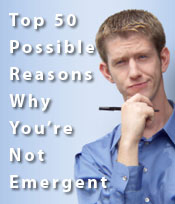
Dear Mr President,
Today you will be chosen to lead what many call the most powerful position in the world. With this comes responsibility to lead. I can only assume that in your running for President you have chosen to accept responsibilities for leadership. So with that I would like to ask you to consider the following possibilities for leading in this brave, new, wired world:
Lead With Love: As President the world will be watching you. In ever move you make, ask the very simple clarifying question, “How would I want to be treated?” Leadership begins with love. It means providing an example for the world to follow. And love, which is begins with seeing and holding the other person’s dignity, is the highest ideal.
Ask Us To Be Responsible And Then Give Us Responsibility: The world is waiting for the most powerful leader to give away power. Help us see a vision for a better America, one that includes lifting our neighbors up, having faith in each other, and being the creative individuals we are. Invite us to participate in our own growth and maturity. Invite us to take responsibilities for our neighborhoods, children and schools. Show us the value of turning our backs on greed as a mechanism for growth.
Live In The Moment: Don’t pretend you are a savior so you can get elected. This could be the most important four, or even eight years, of your life. You have the chance to lead with a sense of abandon. If you act in the moment with wisdom, not worrying about what will happen in 2012, we will almost assuredly vote for you again. But if you pretend to be the our savior, you’ll just be like every politician who sold out.
Give Us A Vision: You have the opportunity to think like a visionary. Give us HUGE problems to dream about and solve and then let us solve them. What would it look like to solve issues like Aids, clean water, and third world poverty. We are the nation of entrepreneurs. We have the creativity and the resources. Will you give us the initiative?
Be Honest: Shoot us straight. We can handle the truth. We may not like it but it’s easier to handle in the long run once we’re over the initial shock. The truth just works better. The truth is we can tell when you’re lying anyway. And when we can’t John Stewart will eventually find out and you’ll look silly.
Don’t Forget The Impoverished: Will you be the President who restores compassion to the Presidency? One of the best ways to do that is to begin with the poor. Show the world what it would look like to think about the least of these in a way that is not patriarchal but restorative. Help our brothers in poverty rise above the muck and mire and restore their dignity. We need you to take a stand against those who oppress the poor, the sick and the widow. Fight for the dignity of those who can’t fight for themselves.
Show Us How To Sacrifice: Ask us to think beyond ourselves but also show the world how. This country was built on sacrifice and it has always been what made us great, not just as Americans, but also as human beings. To sacrifice is to love and become the best of who we were designed to be.
Cross Lines: Show the world what it means to come over the traditional lines of “us” and “them” so we can discover “we the people”. It’s just too easy to focus on what separates us. Help us see and participate in what brings us together and a people. Invite us to cross lines so we can become a more whole people who rise above our own self interests.
Mentor Other Leaders: Spend time with the Fortune 500 leaders of America asking them not just how they can create new jobs here but also how they can use their power in ways that create a better future. Call them to move beyond greed and selfish abandon and to a more meaningful future of love and sacrifice.
Lead With Courage: Take courageous risks that will both succeed and fail. But at least try. Think outside the box and reveal to the world once again why we are the nation that once led the world.
Please consider these requests as you begin looking towards the next four years.
Much love to you.
Jonathan
——————————————————
This post is part of a Synchroblog on Leadership. The following blogs took part in the experiment:
Jonathan Brink – Letter To The President
Adam Gonnerman – Aspiring to the Episcopate
Kai – Leadership – Is Servant Leadership a Broken Model?
Sally Coleman – In the world but not of it- servant leadership for the 21st Century Church
Alan Knox – Submission is given not taken
Joe Miller – Elders Lead a Healthy Family: The Future
Cobus van Wyngaard – Empowering leadership
Steve Hayes – Servant leadership
Geoff Matheson – Leadership
John Smulo – Australian Leadership Lessons
Helen Mildenhall – Leadership
Tyler Savage – Moral Leadership – Is it what we need?
Bryan Riley – Leading is to Listen and Obey
Susan Barnes – Give someone else a turn!
Liz Dyer – A Funny Thing Happened On The Way To The Polls…
Lionel Woods – Why Diverse Leadership is Good for America
Julie Clawson – Leadership Expectations
Ellen Haroutunian – A New Kind Of Leadership
Matt Stone – Converting Leadership
Steve Bradley – Lording or Leading?
Adam Myers – Two types of Leadership
Bethany Stedman – A Leadership Mosaic
Kathy Escobar – I’m Pretty Sure This Book Won’t Make It On The Bestseller List
Fuzzy Orthodoxy – Self Leadership
Sonja Andrews – Leadership In An Age of Cholera
Tara Hull – Leadership & Being A Single Mom
Glen Hager – Election Day Ponderings On Leadership
Beth Patterson – Leadership:Being The River
Bill Ellis – Spiritual Leadership And The Rehumanizing Of Our World
Liz Dyer – A Funny Thing Happened On The Way To The Polls
Joe Speranzella – Leadership: This Election and Social Justice
Andries Louw – South Africa’s leadership crisis
 This November 4th marks a profound opportunity in American history regardless of who takes office to the Presidency. And this focus on leadership got me thinking. What if we got together and had a Synchroblog on leadership. There’s already a group on board but I wanted to open this up and ask if anyone else wanted to participate. If you are interested let me know.
This November 4th marks a profound opportunity in American history regardless of who takes office to the Presidency. And this focus on leadership got me thinking. What if we got together and had a Synchroblog on leadership. There’s already a group on board but I wanted to open this up and ask if anyone else wanted to participate. If you are interested let me know. “And I, I won’t lie. I won’t sin.” –
“And I, I won’t lie. I won’t sin.” – 















